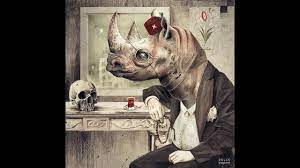Friday
The once unthinkable happened yesterday and we barely noticed. Indeed, you might not know what I have in mind were it not for my headline, but here it is in black and white: on May 5, 2022, the United States passed the mark of a million Covid deaths.
Struck by our seeming indifference, a Baruch College theatre history professor composed a twitter thread about Ionesco’s The Rhinoceros. It’s a good connection to make.
Ionesco wrote his play to capture the herd mentality that can take over a society so that, well, the unthinkable becomes normalized. The particular “unthinkable” he had in mind was rising fascism—also only too relevant in this day and age—but it applies to all situations involving mobthink. Caplan sums up the plot:
[O]ne by one, an entire town of people suddenly transform into rhinos. At first, people are horrified but as the contagion spreads, (almost) everyone comes to accept that turning into a rhinoceros is fine.
Caplan was led to her observations when, walking around New York City, she realized that virtually no one was wearing a mask, even though Covid continues live and well in the country. As she puts it,
Over the last few weeks, as mitigation measures drop, millions of Americans who were previously cautious about Covid (and millions more who never were) have decided that it’s time to move on and pretend that it’s 2019 again.
Bars and restaurants are packed with unmasked people, mask mandates hardly exist anywhere and are no longer tied to infection rates, the new CDC map makes it look like everything is under control, and we seem to have all collectively decided that Covid is “over.
And then she points to the reality:
The idea that we can live with Covid WITHOUT any mitigation measures and expect things to turn out ok (both for individuals and as a society) is a lie. We are watching an astounding mass delusion unfold in real time.
Caplan is particularly concerned about the possibility of contracting Covid repeatedly and reports that even 5% of the vaccinated are getting it. With Covid, meanwhile, comes the possibility of long Covid, which can have devastating effects. I can testify that one of my students this past semester has long Covid—she contracted it abroad very early in the pandemic—and although she bravely soldiers on, it has been making her life miserable.
Caplan notes that she feels like Berenger, who by play’s end is the only human left. Telling people she’s going to keep taking precautions, she says,
feels a little like Berenger’s monologue at the end of the play, where he declares his intent to remain human to a herd of rhinoceroses who no longer understand him. The contagion has already spread, and nobody is listening anymore.
“You’ll get used to it, you know,” Daisy (the love interest) tells Berenger. “It’s the wisest course to take,” his co-worker Dudard agrees. “Well, I can’t get used to it,” Berenger insists. “I wonder if one oughtn’t to give it a try?” Dudard replies. Then, he becomes a rhino.
Later, as more and more of their friends get infected, Daisy begins to change her mind about the value of staying human. “Those are the real people,” Daisy says, about the rhinos. “They look happy. They were right to do what they did.”
“We’re the ones who are doing right, Daisy, I assure you,” Berenger insists. “It’s the world that’s right – not you and me,” Daisy tells him. And then, she becomes a rhino too.
Caplan observes that she has accepted that, in all likelihood, she and her family will get Covid at some time or other. The goal, she says, “is to delay infection for as long as possible. The fewer times we catch Covid, the better.”
And she adds,
People who are trying not to get Covid aren’t “anxious” or “not moving on.” We’re looking at the facts and we’re reasonably concerned. Eliminating an opportunity for a 5% chance of developing serious heart, lung, or brain problems is worth a lot.
Which brings her back to Berenger:
Like Berenger in Rhinoceros, it feels very lonely to be caring about any of this right now. The world has moved on. But it’s the world that’s wrong, not those of us who see this for what it is.
Speaking for myself, I must admit to have gotten casual about wearing a mask. In some ways, I can get away with it since I live in a bubble. Both Sewanee the college and Sewanee the town required masking up until this past March; my students have all been vaccinated; and I myself have been twice vaxxed and twice boosted. All this has led me to become complacent.
Caplan’s Ionesco allusion, however, reminds me that I’ve got to be willing to look weird to others—i.e., put on a mask—when I enter venues that are less protected. My 96-year-old mother, even though fully vaccinated, would have real problems were she to contract a breakthrough case. And I myself am 70.
In other words, don’t let the rhinos of the world dictate your own health choices.


